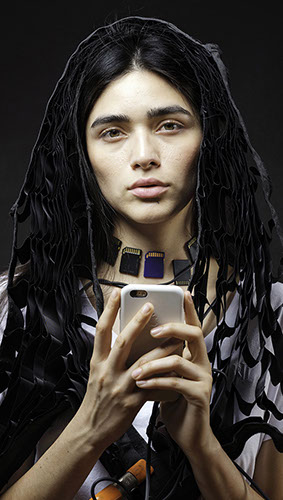
"Cellulite", 2017.

"Technology is my master", 2017.
Wired Series, 2017.
(Series in progress)
“Network culture implies a hyper-connectivity but also extreme isolation, the isolation of the individual before a screen, more connected, but more alone, than ever before.”
Roger Bartra, interviewed by Pablo de Llano, El País, September 13, 2015
I grew up with analog photography. When I was young, a good photographer would spend much of their time in the darkroom, and much of their income went to pay the lab bills. In the 1970s, I was astonished when my father arrived with a hologram. He not only had the opportunity to conduct tests with the hologram, he also experienced the first color photo processing, the first electronic flash, the first digital camera.
In parallel, as time went by I witnessed the gradual transformation of the photographer’s profession of the photographer, the one who used to be entrusted with leaving a record of the passage of a life and the important events in each person’s life.
Yes, science and technology every day bring improvements in our wellness and entertainment, and in many ways they improve the quality of our life. But age-old questions persist: Where do we go when we die? What is the best way to live? How do we nourish the spirit? What is the soul? What do we do with this need to say “I exist” and affirm our identity through selfies, that need to record everything we experience? Are we really less alone? Will there be fewer suicides because we have more immediate ways to “communicate” without having to pick up a phone or see each other?
